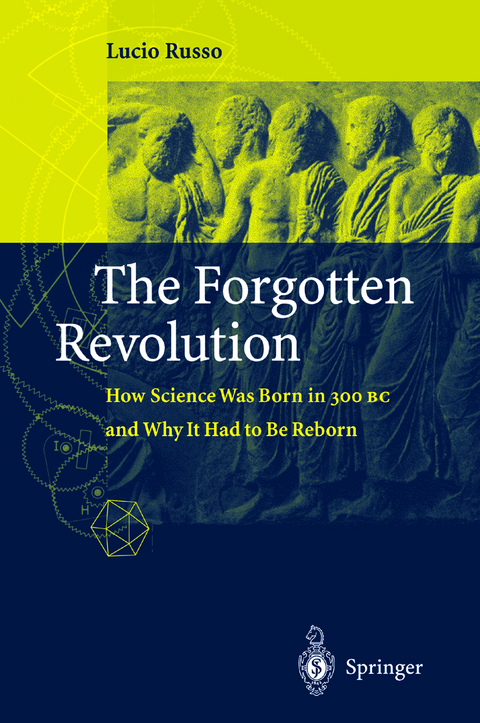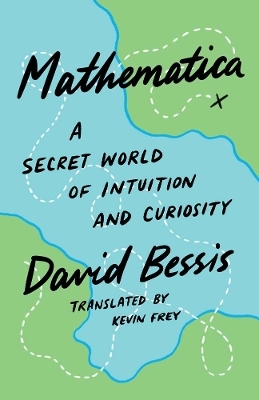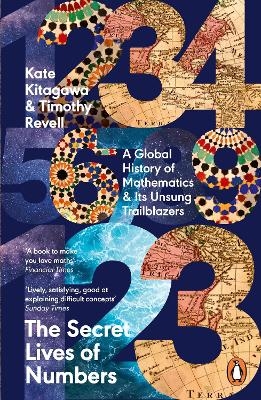
The Forgotten Revolution
Springer Berlin (Verlag)
978-3-540-20068-0 (ISBN)
1 The Birth of Science.- 1.1 The Erasure of the Scientific Revolution.- 1.2 On theWord "Hellenistic".- 1.3 Science.- 1.4 Was There Science in Classical Greece?.- 1.5 Origins of Hellenistic Science.- 2 Hellenistic Mathematics.- 2.1 Precursors of Mathematical Science.- 2.2 Euclid's Hypothetico-Deductive Method.- 2.3 Geometry and Computational Aids.- 2.4 Discrete Mathematics and the Notion of Infinity.- 2.5 Continuous Mathematics.- 2.6 Euclid and His Predecessors.- 2.7 An Application of the "Method of Exhaustion".- 2.8 Trigonometry and Spherical Geometry.- 3 Other Hellenistic Scientific Theories.- 3.1 Optics, Scenography and Catoptrics.- 3.2 Geodesy and Mathematical Geography.- 3.3 Mechanics.- 3.4 Hydrostatics.- 3.5 Pneumatics.- 3.6 Aristarchus, Heliocentrism, and Relative Motion.- 3.7 From the Closed World to the Infinite Universe.- 3.8 Ptolemaic Astronomy.- 4 Scientific Technology.- 4.1 Mechanical Engineering.- 4.2 Instrumentation.- 4.3 Military Technology.- 4.4 Sailing and Navigation.- 4.5 Naval Architecture. The Pharos.- 4.6 Hydraulic and Pneumatic Engineering.- 4.7 Use of Natural Power.- 4.8 The Antikythera Mechanism.- 4.9 Heron'sRole.- 4.10 The Lost Technology.- 5 Medicine and Other Empirical Sciences.- 5.1 The Birth of Anatomy and Physiology.- 5.2 Relationship Between Medicine and Exact Sciences.- 5.3 Anatomical Terminology and the Screw Press.- 5.4 The Scientific Method in Medicine.- 5.5 Development and End of Scientific Medicine.- 5.6 Botany and Zoology.- 5.7 Chemistry.- 6 The Hellenistic Scientific Method.- 6.1 Origins of Scientific Demonstration.- 6.2 Postulates or Hypotheses.- 6.3 Saving the Phainomena.- 6.4 Definitions, Scientific Terms and Theoretical Entities.- 6.5 Episteme and Techne.- 6.6 Postulates and the Meaning of "Mathematics" and"Physics".- 6.7 Hellenistic Science and Experimental Method.- 6.8 Science and Orality.- 6.9 Where Do Clichés about "Ancient Science" Come From?.- 7 Some Other Aspects of the Scientific Revolution.- 7.1 Urban Planning.- 7.2 Conscious and Unconscious Cultural Evolution.- 7.3 The Theory of Dreams.- 7.4 Propositional Logic.- 7.5 Philological and Linguistic Studies.- 7.6 The Figurative Arts, Literature and Music.- 8 The Decadence and End of Science.- 8.1 The Crisis in Hellenistic Science.- 8.2 Rome, Science and Scientific Technology.- 8.3 The End of Ancient Science.- 9 Science, Technology and Economy.- 9.1 Modernism and Primitivism.- 9.2 Scientific and Technological Policy.- 9.3 Economic Growth and Innovation in Agriculture.- 9.4 Nonagricultural Technology and Production.- 9.5 The Role of the City in the Ancient World.- 9.6 The Nature of the Ancient Economy.- 9.7 Ancient Science and Production.- 10 Lost Science.- 10.1 Lost Optics.- 10.2 Eratosthenes' Measurement of the Meridian.- 10.3 Determinism, Chance and Atoms.- 10.4 Combinatorics and Logic.- 10.5 Ptolemy and Hellenistic Astronomy.- 10.6 The Moon, the Sling and Hipparchus.- 10.7 A Passage of Seneca.- 10.8 Rays of Darkness and Triangular Rays.- 10.9 The Idea of Gravity after Aristotle.- 10.10 Tides.- 10.11 The Shape of the Earth: Sling or Ellipsoid?.- 10.12 Seleucus and the Proof of Heliocentrism.- 10.13 Precession, Comets, etc..- 10.14 Ptolemy and Theon of Smyrna.- 10.15 The First Few Definitions in the Elements.- 11 The Age-Long Recovery.- 11.1 The Early Renaissances.- 11.2 The Renaissance.- 11.3 The Rediscovery of Optics in Europe.- 11.4 A Late Disciple of Archimedes.- 11.5 Two Modern Scientists: Kepler and Descartes.- 11.6 Terrestrial Motion, Tides and Gravitation.- 11.7 Newton's Natural Philosophy.-11.8 The Rift Between Mathematics and Physics.- 11.9 Ancient Science and Modern Science.- 11.10 The Erasure of Ancient Science.- 11.11 Recovery and Crisis of Scientific Methodology.- List of Passages.- References.- General Index.
From the reviews:
"Russo has achieved and exhibited an extensive survey of science in the Hellenistic world at the time after Aristotle ... . The treat in store for the reader of this book is the vast learning that Lucio Russo has acquired, which he explains with lucidity. ... it is useful for private study, for one's own enlightenment; on the other it will enrich every science course and every history course that involves these time periods." (Samuel S. Kutler, MAA online, September, 2004)
"Russo presents an enticing vision of a Hellenistic world with a highly organized scientific effort that lasted for centuries. ... The copious, informative and useful illustrations in this beautifully produced volume intensify the sense of what was lost when this great civilization went into decline and perished." (Mott Greene, NATURE, August, 2004)
"The central thesis of the book is that science originated in the Hellenistic period ... . To summarize the book: It certainly has a number of good points. The author has combed through ¼200 medieval texts (plus others). There are lots of footnotes identifying sources (even in different editions of the same book) and an index of writings consulted (with page numbers). ... a very remarkable book in its depth and the boldness of its claims." (Nimish Shah, Newsletter of the London Mathematical Society, March, 2005)
| Erscheint lt. Verlag | 26.11.2003 |
|---|---|
| Zusatzinfo | IX, 487 p. |
| Verlagsort | Berlin |
| Sprache | englisch |
| Maße | 155 x 235 mm |
| Gewicht | 950 g |
| Themenwelt | Sachbuch/Ratgeber ► Natur / Technik |
| Mathematik / Informatik ► Mathematik ► Geschichte der Mathematik | |
| Naturwissenschaften | |
| Schlagworte | Antike; Geistes-/Kultur-Geschichte • Astronomy • Euclid • Greek mathematics • Greek science • heliocentrism • Hellenistic Science • History of Mathematics • Mechanics • MSC (2000): 01A20 • Naturwissenschaft, Geschichte • Philosophy • philosophy of science • Proposition • Renaissance • Scientific renaissance • Scientific Revolution |
| ISBN-10 | 3-540-20068-1 / 3540200681 |
| ISBN-13 | 978-3-540-20068-0 / 9783540200680 |
| Zustand | Neuware |
| Haben Sie eine Frage zum Produkt? |
aus dem Bereich


